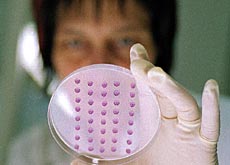
Hope of medical progress carries vote

Swiss voters’ approval of embryonic stem-cell research is being seen as a vote for medical progress and a boost for research.
Two-thirds of voters came out in favour of the proposal, but turnout was low at 36 per cent.
A committee of renowned scientists said the result was a vote of confidence in medical research and a positive sign for Switzerland as a centre for science and research.
It said voters had rejected an outright ban on research, opting instead for strict controls.
“I think voters recognised that the proposed law sets very strict conditions for stem-cell research,” said leading biologist Marisa Jaconi, who was the first in Switzerland to carry out research with human embryonic stem cells.
Jaconi told swissinfo that Sunday’s vote validated her research, which she conducts using imported stem cells, at Geneva University.
“Now we can go ahead with our project, and it gives us the possibility to import more cells and to use the surplus embryos stored in Switzerland.
“It will also make it easier to cooperate with other countries which have similar legal regulations,” Jaconi added.
The pharmaceutical industry welcomed the result, which it said gave patients hope for new cures.
Ethical concerns
Ruth Baumann-Hölzle, a theologian and ethicist who opposed the new law said she was surprised at the high approval rate of 66 per cent.
“I fear that future plans for embryonic research and the cloning of embryos will be speeded up,” Baumann-Hölzle told swissinfo.
She added that many voters were probably not aware that the poll marked an important step towards “reducing human life to the status of an object”.
Other opponents, notably from religious and pro-life groups, said voters probably did not consider the full ethical implications of the poll.
Critics of genetic engineering pointed out that the result was misleading because many voters did not cast their ballots.
They pledged to keep a close eye on future stem-cell research.
Low turnout
Overall turnout in the three issues being decided on Sunday was below average, at 36 per cent.
Analysts say the low percentage could reflect voter confusion given the complex issues at stake and conflicting arguments.
Apart from stem-cell research, the electorate also had the final say on a reform of the federal system and a new mandate for the federal government to impose taxes.
The law on stem-cell research passed with a two-thirds majority at the ballot box.
The approval rate was highest in canton Geneva at nearly 85 per cent, ahead of cantons Vaud (84 per cent) and Neuchâtel (75 per cent).
Catholic rural cantons Valais, Appenzell Inner Rhodes and Obwalden came bottom of the table with approval rates between 54 and 56 per cent.
swissinfo, Urs Geiser
66% of voters said yes to allowing stem-cell research under strict conditions.
Parliament approved the law last year but religious groups and leftwing critics of genetic engineering challenged the legislation to a nationwide vote.
The Swiss law is considered moderate compared with legislation in other European countries.

In compliance with the JTI standards
More: SWI swissinfo.ch certified by the Journalism Trust Initiative





























You can find an overview of ongoing debates with our journalists here . Please join us!
If you want to start a conversation about a topic raised in this article or want to report factual errors, email us at english@swissinfo.ch.